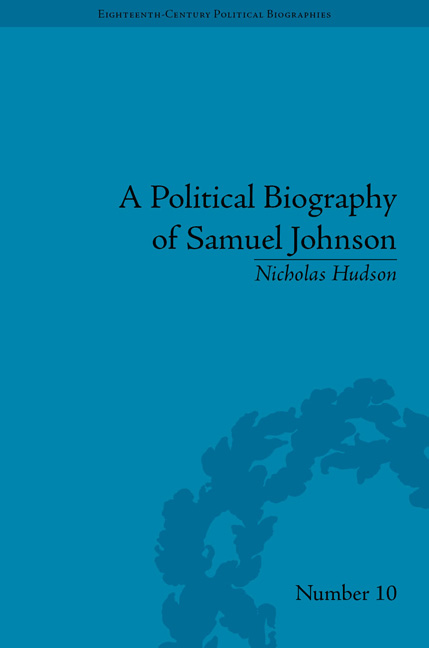Book contents
- Frontmatter
- CONTENTS
- Dedication
- Acknowledgements
- Note on the Text
- Introduction
- 1 Political Origins, 1709–36
- 2 The Patriot Opposition, 1737–9
- 3 An Independent Voice, 1740–55
- 4 The Seven Years War, 1756–63
- 5 Defender of King and State, 1763–70
- 6 Troubles of Empire, 1771–84
- Conclusion
- Notes
- Works Cited
- Index
5 - Defender of King and State, 1763–70
- Frontmatter
- CONTENTS
- Dedication
- Acknowledgements
- Note on the Text
- Introduction
- 1 Political Origins, 1709–36
- 2 The Patriot Opposition, 1737–9
- 3 An Independent Voice, 1740–55
- 4 The Seven Years War, 1756–63
- 5 Defender of King and State, 1763–70
- 6 Troubles of Empire, 1771–84
- Conclusion
- Notes
- Works Cited
- Index
Summary
The Political Point of View of Boswell's Life of Johnson
By the early 1760s, Johnson was an established writer and a famous man whose conversation and letters were being preserved and passed down to us as never before. From this point on, we can consider an unprecedented wealth of biographical detail.
Our reading of Johnson's development over his last twenty years is nonetheless complicated by his retreat from the political journalism that had for so long been his main vehicle of expression. With the exception of four substantial pamphlets published between 1770 and 1775, our perception of his politics during these later years is heavily mediated by others. Above all, he became known to later generations through the biography of the twenty-two-year-old Scot who met him in May 1763. Amongst the most controversial questions in Johnson studies is the degree to which James Boswell may have coloured or even distorted our vision of this middle-aged veteran of a previous era in English politics.
Donald Greene's attempt to rescue Johnson from his traditional image as an intolerant Tory or even Jacobite was inevitably linked with his assault on Boswell as a reliable biographer, for it was indeed the Life that most influenced the perception of his politics from the nineteenth well into the twentieth century. According to Greene, Boswell was simply not equipped by background, education and temperament to understand Johnson's politics.
- Type
- Chapter
- Information
- A Political Biography of Samuel Johnson , pp. 119 - 150Publisher: Pickering & ChattoFirst published in: 2014



